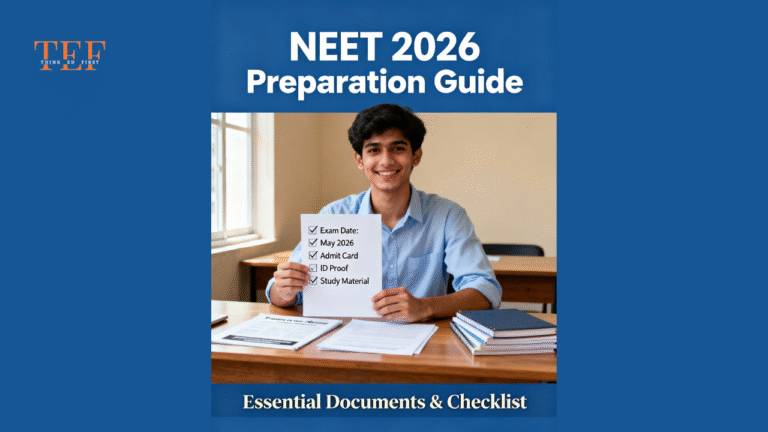What if the key to cracking NEET lies not just in hard work, but in smart planning? With millions of aspirants competing for limited seats, a well-structured approach can make all the difference. This guide is designed to help you navigate the challenges of the exam with clarity and confidence.
Preparing for NEET requires more than just studying; it demands discipline, consistency, and effective time management. Many students face common pitfalls, such as lack of focus or poor planning, which can hinder their progress. However, with the right strategy, these obstacles can be overcome.
Our month-by-month study plan provides a roadmap to success. It emphasizes self-study, regular practice, and a balanced approach to all subjects. By following this guide, you can transform your preparation journey into a structured and rewarding experience.
Understanding the NEET Syllabus and Exam Structure
Mastering the NEET syllabus is the first step toward achieving your medical career goals. A clear understanding of the exam’s structure and weightages can help you focus your efforts effectively. Let’s break down the essentials to ensure you’re on the right track.
Overview of the NEET Syllabus
The syllabus covers three main subjects: Physics, Chemistry, and Biology. It’s designed to test your conceptual understanding and application skills. Approximately 75-80% of the questions are based on NCERT textbooks, making them a critical resource for preparation.
Recent updates have streamlined the syllabus, reducing it to 79 chapters. Topics like “Free charges and bound charges inside a conductor” in Physics and “Three domains of life” in Biology have been removed. Staying updated with these changes ensures you focus on relevant content.
Key Weightages and Subject Breakdown
The exam consists of 180 questions, divided equally among the subjects. Physics and Chemistry each have 45 questions, while Biology has 90. The marking scheme awards 4 marks for correct answers and deducts 1 mark for incorrect ones.
Understanding the weightages is crucial. For instance, Biology carries half the total marks, making it a high-priority subject. Physics emphasizes theory (80%), while Chemistry is divided into Physical, Inorganic, and Organic components with varying weightages.
By analyzing the syllabus and exam pattern, you can tailor your study plan to maximize efficiency and performance.
Effective neet one year preparation Strategies
Setting clear goals and analyzing past attempts are crucial for effective exam readiness. By identifying weaknesses and focusing on strengths, you can create a targeted approach to your studies. This strategy ensures you make the most of your time and effort.
Analyzing Previous Attempts and Setting Realistic Goals
Reviewing past performances helps pinpoint areas needing improvement. For instance, if certain topics consistently challenge you, allocate more time to them. Setting achievable goals keeps you motivated and on track throughout your preparation journey.
Designing a Balanced Timetable
A well-structured timetable is essential for covering all subjects systematically. Allocate specific time blocks for Physics, Chemistry, and Biology, ensuring equal attention to each. Include regular breaks to maintain focus and productivity.
Incorporate mock tests into your schedule to simulate the exam environment. These practice sessions help identify gaps in knowledge and improve time management. Consistent practice with previous year’s questions also builds confidence and familiarity with the exam pattern.
Finally, evaluate your progress weekly. Adjust your study plan as needed to address weak areas and reinforce strong ones. This dynamic approach ensures continuous improvement and maximizes your chances of success.
Crafting Our Month-by-Month Study Plan
A structured month-by-month approach can transform your preparation into a systematic and stress-free journey. By dividing your time into distinct phases, you can build a strong foundation, deepen your understanding, and refine your skills for the final push.
Initial Months: Building Conceptual Clarity
The first phase focuses on establishing a solid grasp of core concepts. Start with NCERT textbooks, as they are the backbone of the syllabus. Allocate time to understand the fundamentals of physics, chemistry, and biology. Create concise notes to simplify complex topics for future revisions.
Use this period to identify your strengths and weaknesses. Regularly solve basic problems to reinforce your understanding. This phase sets the stage for more advanced learning in the months ahead.
Mid-Year Strategy: Delving Deeper and Practice Sessions
Once the basics are clear, shift your focus to advanced topics. Dive deeper into challenging areas like organic chemistry, thermodynamics, and genetics. Incorporate strategic practice sessions to apply your knowledge effectively.
Revisit topics that initially seemed difficult. Solve a variety of problems to enhance your problem-solving skills. This phase is crucial for bridging the gap between theory and application.
Final Months: Intensive Revision and Mock Tests
The last phase is all about revision and practice. Focus on solving previous year question papers and taking full-length mock tests. Analyze your performance to identify areas that need improvement.
Create a revision schedule that prioritizes high-weightage topics. Use your notes for quick recaps. This phase ensures you are exam-ready and confident in your preparation.
| Phase | Focus Areas | Key Activities |
|---|---|---|
| Initial Months | Core Concepts | NCERT textbooks, note-making, basic problem-solving |
| Mid-Year | Advanced Topics | Deep learning, strategic practice, revisiting tough topics |
| Final Months | Revision & Mock Tests | Previous year papers, full-length mocks, focused revision |
Revision Techniques, Mock Tests, and Concept Reinforcement
To excel in competitive exams, consistent revision and practice are non-negotiable. These strategies not only reinforce learned concepts but also build confidence and improve performance. Let’s explore how to make the most of these tools.
Importance of Regular Revision
Frequent revision sessions are essential for retaining key concepts. Without regular recaps, even well-understood topics can fade from memory. A structured revision schedule ensures that all subjects are covered systematically.
Focus on high-weightage topics and use concise notes for quick recaps. This approach saves time and helps you stay on track. Regular revision also reduces last-minute stress, allowing you to approach the exam with confidence.
Utilizing Previous Year Question Papers and Mock Tests
Solving previous year question papers is a proven way to understand the exam pattern and difficulty level. It helps identify recurring topics and strengthens your problem-solving skills. Mock tests, on the other hand, simulate the actual exam environment.
Here’s how to make the most of these resources:
- Take at least one mock test weekly to improve speed and accuracy.
- Analyze your performance to identify weak areas and focus on them.
- Use video tutorials and online forums to clear doubts promptly.
Combining these strategies ensures a well-rounded preparation. For a more detailed approach, explore our structured study plan, which includes tailored resources and expert guidance.
Self-Motivation and Resources for Sustained Effort
Staying motivated during intense study periods can be challenging, but the right tools and community can make all the difference. For every aspirant, maintaining a positive mindset and leveraging available resources are essential for long-term success.
Balancing self-study with external support ensures steady progress. By incorporating technology and peer feedback, you can enhance your learning experience and stay on track.
Leveraging Online Tutorials and Study Apps
Online tutorials and study apps are powerful tools for modern students. Platforms offering curated courses can help you grasp complex topics with ease. These resources often include interactive lessons, quizzes, and video explanations, making learning engaging and effective.
Here are some tips to maximize their use:
- Choose apps that align with your syllabus and learning style.
- Set aside dedicated hours each week to explore these resources.
- Use them to reinforce concepts taught in class.
Building a Supportive Study Community
Joining a study group or online community can provide much-needed motivation. Sharing ideas, solving problems together, and discussing challenging topics can make the journey less daunting. Peer support also helps you stay accountable and focused.
Consider these strategies to build a strong community:
- Participate in forums or social media groups for aspirants.
- Organize weekly study sessions with peers.
- Seek mentorship from those who have successfully cleared the exam.
For more detailed strategies, explore our structured study plan, which includes tailored resources and expert guidance.
Conclusion
Success in competitive exams like NEET hinges on a blend of dedication and strategic planning. Following a structured, month-by-month plan ensures that every topic is covered efficiently, leaving no room for last-minute stress.
Regular revision and mock tests are crucial for reinforcing concepts and improving speed and accuracy. These practices not only build confidence but also help identify areas that need more attention. Hard work, paired with effective planning, significantly increases your chances of cracking the exam.
Stay focused and celebrate small victories along the way. Each day of consistent study brings you closer to your goal. With persistence and the right approach, you can overcome challenges and secure a promising future in the medical field.





